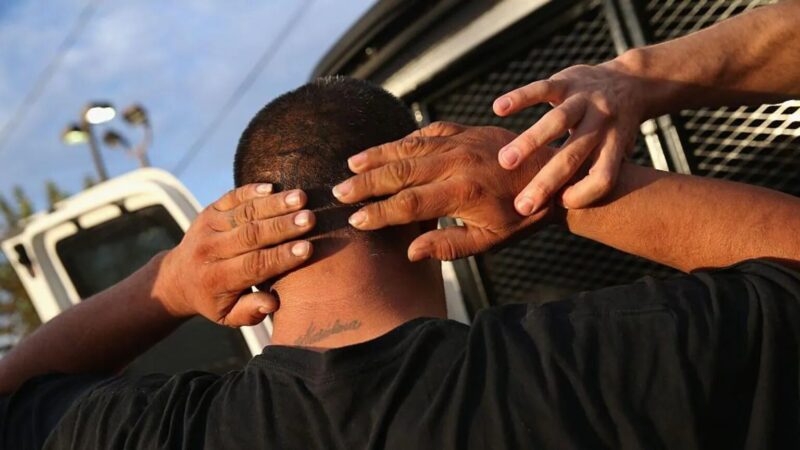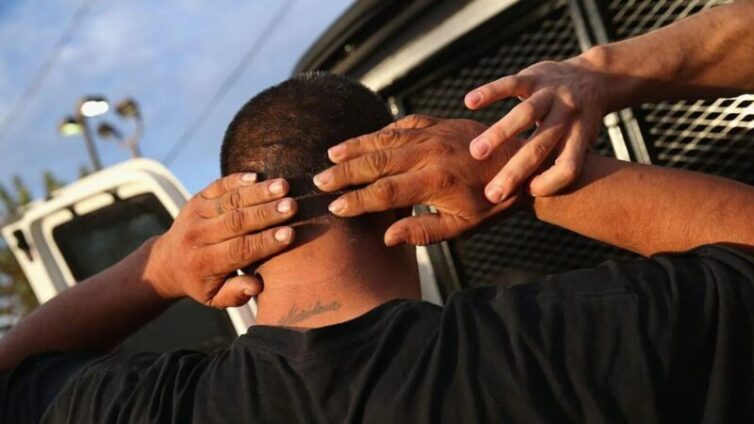Gabriela entered the United States more than two decades ago, gasping for breath under a pile of corn stalks in the boot of a smuggler's car.
Now a housekeeper in Maryland, the Bolivian national is one of at least 13 million undocumented migrants living in the US - an umbrella term that includes those who entered the US illegally, overstayed their visas or have protected status to avoid deportation.
Across the US, migrants like Gabriela are grappling with what the incoming Trump administration's vow to conduct mass deportations could mean for their future.
In over a dozen interviews, undocumented immigrants said it was a topic of heated discussion in their communities, WhatsApp groups and social media.
Some, like Gabriela, believe it won't impact them at all.
"I'm not scared at all, actually," she said. "That's for criminals to worry about. I pay taxes, and I work."
"In any case, I'm undocumented," she added. "[So] how would they even know about me?"
In an election campaign where immigration loomed large as a major concern of US voters, Trump frequently pledged to deport migrants en masse from US soil from his first day in office if he were to return to the presidency.
But nearly two weeks after his sweeping election win, it remains unclear what exactly these immigration enforcement operations will look like.
The president-elect has insisted cost won't be an issue, but experts have cautioned that his promises may run into enormous financial and logistics challenges.
His newly appointed "border tsar", Tom Homan, has said that undocumented migrants deemed to be national security or public safety threats will be a priority. And he has suggested workplace raids - a practice ended by the Biden administration - could return.
Speaking to Fox News on Saturday, the former acting director of Immigrations and Customs Enforcement during Trump's first term challenged the notion that "those who enforce the law are the bad guys and those who break the law are the victims".

"What member of Congress, what governor or what mayor is against taking public safety threats out of their community?" he asked, adding that the new administration would "follow through on the mandate that American people gave President Trump".
US authorities deporting migrants is nothing new. More than 1.5 million people have been expelled under President Joe Biden, in addition to millions swiftly turned away from the border during the Covid-19 pandemic.
During the eight-year administration of Barack Obama - whom some dubbed the "deporter-in-chief" - about three million people were deported, with a focus on single men from Mexico who could easily be deported from border regions.
Trump's promised plans, however, are more wide-ranging and aggressive, including enforcement operations in the US far from the border. Officials are reportedly also mulling using the National Guard and military aircraft to detain and ultimately deport people.
JD Vance, Trump's running mate and incoming vice-president, has said that the deportations could "start" with one million people.
Still, some undocumented migrants believe that they will benefit from a Trump presidency instead of being kicked out.
"A lot of Latinos, those who can vote, did so because they think he [Trump] can improve the economy. That would be very good for us too," said Carlos, an undocumented Mexican who lives in New York City. His son is a US citizen.
According to the American Immigration Council - a non-partisan organisation that conducts research and advocates for an overhaul of the US immigration system - there are more than five million Americans who were born to undocumented parents and have the security of US citizenship.
Carlos says he is "a little" worried about getting swept up in immigration raids. But that fear is tempered by the possibility of an improved economy under Trump and more work.
"Things may be a bit tense right in our communities right now, but being worried isn't a solution," he said. "The best thing to do is avoid problems and not commit any crimes."
There are many others who don't share in this optimism and are living in fear.
Among them is California resident Eric Bautista, a so-called "Dreamer", who benefits from a longstanding programme that protects from deportation those who were brought illegally into the US as children.
At 29, Mr Bautista has only fleeting memories of life in Mexico, the country in which he was born and left at the age of seven.
For the last four years, he has taught US history to high schoolers - including details of how waves of immigrants from Italy, Ireland, China, Japan and Mexico settled in the country and often faced xenophobia.
"I don't think I've ever felt this way, even after more than 20 years here," Mr Bautista told the BBC. "It feels like we're at a turning point, a new wave of nativism like those I teach about.
"It's just a future of fear and uncertainty for us."
Advocates and legal experts said there was no guarantee that undocumented migrants without criminal convictions would not be ensnared in ramped-up deportation efforts.
Aaron Reichlin-Melnick, policy director at the American Immigration Council, said that he foresaw an uptick in "collateral arrests" - a term used in the first Trump administration to describe immigrants swept up during enforcement actions even though they may not have been the original targets.
"Let's say they go after somebody with a criminal record, and that person lives in a house with four other [undocumented] people," he said. "We saw with the first Trump administration, they'll arrest those people as well."
In a recent interview with CBS, the BBC's US partner, Homan was asked about a hypothetical situation in which a grandmother was caught up in a "targeted" enforcement operation going after criminals.
When asked if she would be deported, Homan responded "it depends".
"Let the judge decide," he said. "We're gonna remove people that a judge has ordered deported."

The arrest and potential removal of such collateral arrests would mark a drastic departure from the Biden administration, which has focused on public safety threats and deporting people soon after their apprehension at the border.
While Homan recently dismissed suggestions that there could be "a mass sweep of neighbourhoods" or large detention camps set up, the stock prices of companies that could be involved in building detention facilities have jumped by as much as 90% since the election. They include publicly traded prison firms GEO Group and CoreCivic.
Undocumented migrants are employed throughout the US economy - from agricultural fields to warehouses and construction sites.
Mr Reichlin-Melnick said operations targeting such workplaces could lead to "indiscriminate" detentions.
"I don't think that being a person with no criminal record [who] pays taxes protects anybody," he said. "One of the first things that Trump will do is get rid of the Biden administration's enforcement priorities. And we've seen that when there are no priorities, they will go after whoever are the easiest targets."
The possibility of becoming "an easy target" has worried many migrants - particularly those from families with mixed legal statuses. Their biggest fear is finding themselves separated.
Brenda, a 37-year-old Mexico-born "Dreamer" in Texas, is currently protected from deportation but her husband and her mother are not.
Her two children were born in the US and are American citizens.
While Brenda told the BBC she does not believe that "good people" would be the first targets for deportation, she can't escape the thought that her husband could be sent back to Mexico.
"It's important for us that we see our sons grow up," she said. "Of course, the thought of being separated leaves one frightened."
Latest Stories
-
Bawumia joins thousands in Kumasi for burial prayers for Ashanti Regional Imam
2 hours -
Blue Gold Bogoso Prestea Limited challenges government actions in court
3 hours -
Verdicts due for 51 men in Pelicot mass rape trial that shook France
3 hours -
Syria not a threat to world, rebel leader Ahmed al-Sharaa tells BBC
3 hours -
Patrick Atangana Fouda: ‘A hero of the fight against HIV leaves us’
3 hours -
Trinity Oil MD Gabriel Kumi elected Board Chairman of Chamber of Oil Marketing Companies
4 hours -
ORAL campaign key to NDC’s election victory – North America Dema Naa
4 hours -
US Supreme Court to hear TikTok challenge to potential ban
4 hours -
Amazon faces US strike threat ahead of Christmas
5 hours -
Jaguar Land Rover electric car whistleblower sacked
5 hours -
US makes third interest rate cut despite inflation risk
5 hours -
Fish processors call for intervention against illegal trawling activities
5 hours -
Ghana will take time to recover – Akorfa Edjeani
6 hours -
Boakye Agyarko urges reforms to revitalise NPP after election defeat
6 hours -
Finance Minister skips mini-budget presentation for third time
6 hours

